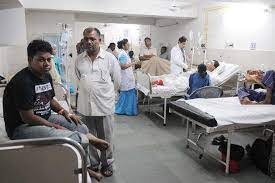The national capital saw 121 cases in July, bringing the total up to 243 cases as of 28 July.
New Delhi
The number of dengue cases in Delhi saw a two-fold rise in July, as the national capital saw 121 cases in July, bringing the total up to 243 cases as of 28 July. The city has also seen a rise in cases of malaria and chikungunya, with 72 cases of malaria and 14 cases of chikungunya reported until 28 July.
Dengue, malaria, and chikungunya cases typically reach their peak in August and September, but this year, the peak was in July and this has made circumstances more challenging. As per health experts, this rise in dengue cases is the result of the recent floods, as a vector of dengue was found in a stagnant water area.
According to experts, there are four dengue viruses: DENV-1, DENV-2, DENV-3, and DENV-4. The Delhi health department has revealed that genome sequencing of 20 samples showed that 19 of them were type two dengue, which poses a higher risk to patients.
With dengue cases rising sharply, The Sunday Guardian talked to Youdhvir Singh, Assistant Professor of Critical Care at AIIMS. He said that dengue outbreaks during the monsoon season are not unusual in Delhi, which has a tropical climate. The warm and humid conditions during this time create a favorable breeding ground for the Aedes mosquito, which transmits the dengue virus.
Symptoms of Dengue: Fever lasting 3 to 5 days
Precautions
Regarding precautions an individual should take against dengue, Singh said it is essential for the public to remain vigilant and seek immediate medical attention if they experience any symptoms related to dengue. He also advised patients to stay hydrated and seek immediate medical attention if their platelet count falls rapidly below 50,000 and they experience dangerous signs like bleeding from the nose or mouth or low blood pressure.
As a measure of precaution mosquito nets should be used while sleeping, and mosquito-repellent creams should be applied. Stagnant water should be avoided in one’s surroundings, and body-covered clothes should be worn. Self-medication should be completely avoided especially, the use of Aspirin or Brufen, which can reduce platelet counts.
Delhi health minister Saurabh Bhardwaj, has announced that the government has instructed officials to run dengue awareness campaigns in schools and among citizens to curb the spread of the vector-borne disease transmitted through mosquitoes. Bharadwaj has also said that hospitals will be made ready for dengue cases. “I also discussed this with the Municipal Corporation of Delhi (MCD) commissioner,” he said.
The Delhi government has also decided to reserve 5% of beds in all hospitals for dengue patients and provide test reports within six to eight hours of admission. The Health Minister has asked hospital officials to establish separate wards for dengue patients and place mosquito nets around their beds to prevent the transmission of the disease to other patients.
However, BJP leader of Opposition in the Delhi Assembly, Ramvir Singh Bidhuri, alleged that the Delhi government has been slow to take concrete measures against the dengue, adding that the AAP government needs to be vigilant against the “increasing threat” of diseases such as dengue and influenza after the floods.

